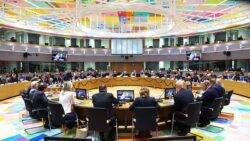Unanimity rules can be used by one single member state to derail or block a collective decision.
Hungary and Poland are mounting a push to retain the unanimity rule in the European Union’s foreign and security policy, a blunt response to a recently formed coalition that is pressing to adopt qualified majority and put an end to the veto power.
The move was announced on Monday afternoon by P?ter Szijj?rt?, Hungary’s foreign affairs minister, who said preliminary talks were ongoing to oppose the new “group of friends” for qualified majority, which includes, among others, Germany and France, the bloc’s most influential members.
“Of course, on the other side, a team is also being organised, if I may say. We had negotiation sat the ambassadorial level here in Brussels” Szijj?rt? told reporters.
“Those member states who want to keep unanimity and the possibility to defend their national interests in Brussels decision-making – they want to have close cooperation.”
Szijj?rt? did not name the countries that had taken part in the discussions.
Later on Monday, his Polish counterpart, Zbigniew Rau, voiced his public endorsement.
“Poland will never support the idea of moving away from unanimity to qualified majority voting #QMV in the common foreign and security policy,” Rau said on Twitter.
A diplomatic source told Euronews the pro-unanimity faction could encompass up to nine EU countries, although no official list has yet been released.
It’s unclear if the talks will result in a formal association or a fluid arrangement.
The effort is meant to counterbalance the “group of friends” formed earlier this month by Belgium, Finland, France, Germany, Italy, Luxembourg, the Netherlands, Slovenia and Spain.
Romania officially joined the group on Monday, while Denmark opted in as an observer. Josep Borrell, the EU’s foreign policy chief, has personally backed the initiative.
The growing coalition wants to remake EU foreign policy in a “pragmatic way” by gradually moving away from unanimity, a voting rule that applies only to select areas of EU policy-making, such as enlargement, taxation and the common budget.
The need to have 27 assenting votes is often exploited by a single capital to postpone, derail or outright veto collective decisions.
Hungary, in particular, has been heavily criticised for repeatedly using this individual power to obstruct key agreements, causing the frustration of its fellow member states.
This tactic was employed once again on Monday, when Budapest blocked the release of a new tranche of EUR500 million in EU military assistance for Ukraine after Kyiv listed OTP Bank, Hungary’s largest commercial bank, as an “international sponsor of war.”
The bank, as well as other private companies on the list, vigorously reject these claims, saying the reasoning is incorrect and not objective.
This piece has been updated to include new developments.





